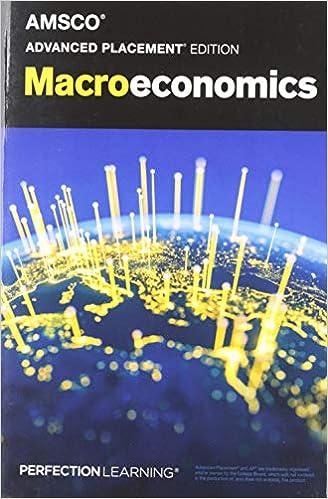Question
Korea raises minimum wage 2.9% to 8,590 won for 2020 July 12, 2019 ( The Korea Times ) The Minimum Wage Commission, involving labor and
Korea raises minimum wage 2.9% to 8,590 won for 2020
July 12, 2019 (The Korea Times)
The Minimum Wage Commission, involving labor and business representatives and experts, set the minimum wage at 8,590 won (US$7.32) per hour for next year (2020), compared with 8,350 won for this year (2019). The growth rate sharply slowed from a 10.9 percent rise for 2019 and is the slowest gain since the minimum wage for 2010 rose 2.8 percent. For 2018, the hourly pay rose 16.4 percent on-year to 7,530 won per hour, the steepest rise in 17 years.
Question 1. Suppose that the market for unskilled labor is a perfectly competitive market and the equilibrium wage in this market is 8,000 won per hour in 2018, 2019, and 2020. Using a supply-and-demand diagram of the market for unskilled labor, show (1) the size of employment in 2018 (), (2) the size of unemployment in 2018 (), (3) the size of employmentin 2019 (), (4) the size of unemployment in 2019 (), (5) the size of employment in 2020 (), and (6) the size of unemployment in 2020 (). Draw one big supplyand-demand diagram of the market for unskilled labor in page 3 in this assignment and show (1) ~ (6) on the graph.
(7) ~ (9) What are the market wages in 2018, 2019, and 2020, respectively? (Please write the number only (no comma and monetary unit (won).)
(7)The market wage in 2018:
(8)The market wage in 2019:
(9)The market wage in 2020:
(10)Write your own opinion whether you are for or against the increase in the minimum wage over the last three years. Also, write the rationale behind your argument.
Question 2. When hiring employees in Korea, all employers must enroll their employees in social insurance schemes such as national pension, health insurance, and employment insurance. Employers and employees are required to equally share the cost burden of the contributions according to the relevant laws. Consider the social insurance contributions as a tax on labor (a labor tax or a payroll tax).
(1)Who do you think bears a larger share of this labor (payroll) tax burden, employers or employees, or fifty-fifty?
(2)Which do you think is more elastic, the supply of labor or the demand of labor?
(3)~ (5) To support your argument, draw a supply-and-demand diagram of the labor market in page 3 in this assignment and show (3) the initial supply curve and (4) the initial demand curve, and (5) the wage without the tax. The graph has to be drawn in a way that it supports your argument in 2(1) and 2(2).
(6) ~ (7) Decide whether the tax levied on both the buyers and sellers of labor shifts the supply curve, demand curve, or perhaps both, and show on the graph (6) the shifts in the curves and (7) the new equilibrium.
(8) ~ (10) Show (8) the size of the tax, (9) the wage employers pay, and (10) the wage workers receive.
(11)Show on the graph the deadweight loss of the tax.
(12)What effect does the labor tax have on employment?
(13)What effect does the labor tax have on unemployment?
Step by Step Solution
There are 3 Steps involved in it
Step: 1

Get Instant Access to Expert-Tailored Solutions
See step-by-step solutions with expert insights and AI powered tools for academic success
Step: 2

Step: 3

Ace Your Homework with AI
Get the answers you need in no time with our AI-driven, step-by-step assistance
Get Started


